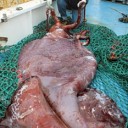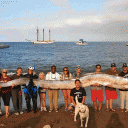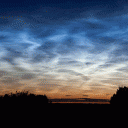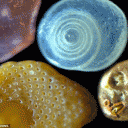Just Plain Weird
Fond of Spinning
Golden silk orb-weaver spiders weave impressive webs and their genus name Nephila means fond of spinning. The webs themselves are golden and very strong and the spider will rebuild parts of the web if they become damaged. Webs are often … Continue reading
Green Glowing Worms
Deep in the Amazon rainforest of Peru, nature photographer Jeff Cremer discovered a tiny worm that lights up the soil with a green glow. These strange green glowing worms emerge at night and use their ability to light up, known … Continue reading
The Kraken?

Imagine fishing the Ross Sea in Antarctica for Chilean Seabass and you pull up the nets to discover a 770 lb (350 kg) squid as big as a minivan. That’s what happened to John Bennett and his crew aboard their … Continue reading
Tree Ring Music
Who knew that the rings of a tree could generate musical sounds? The artist Bartholomäus Traubeck has built a record player that can “play” a cross-sectional slice of a tree. It’s not really like any other record player. This device … Continue reading
A Springtime (Froggy) Miracle
Robert Krulwich reveals an amazing frozen frog that magically comes to life with the sun.
An Irruption?
Snowy owls are one of the most beautiful and rare birds on the planet. They spend their time mainly in the Arctic Circle but have occasionally been seen in Canada and the northern United States. But something strange happened last … Continue reading
Oarfish Discovery

What do you do when you find the body of a fish that is about 18 feet long? Jasmine Santana, a marine science instructor from the Catalina Island Marine Institute, was snorkeling in Toyon Bay on the east side of … Continue reading
Rare Wisps of Icy Light

By Diane K. Fisher The sky has to be clear to see them. They are wispy clouds that glow in the dark sky for a while after the Sun goes down. They are called noctilucent clouds. Noctilucent means “night glowing.” … Continue reading
Packing material from mushrooms?
There are three principles that should govern better materials. Firstly, they should be able to be created almost anywhere on the planet. Secondly, they should require considerably less energy to produce than current materials. Lastly, they should be able to … Continue reading
A Grain of Sand

To see a world in a grain of sand. — William Blake Professor Gary Greenberg set out to do just that. He spent five years taking samples of sand from all over the world and then with a new photographic … Continue reading
